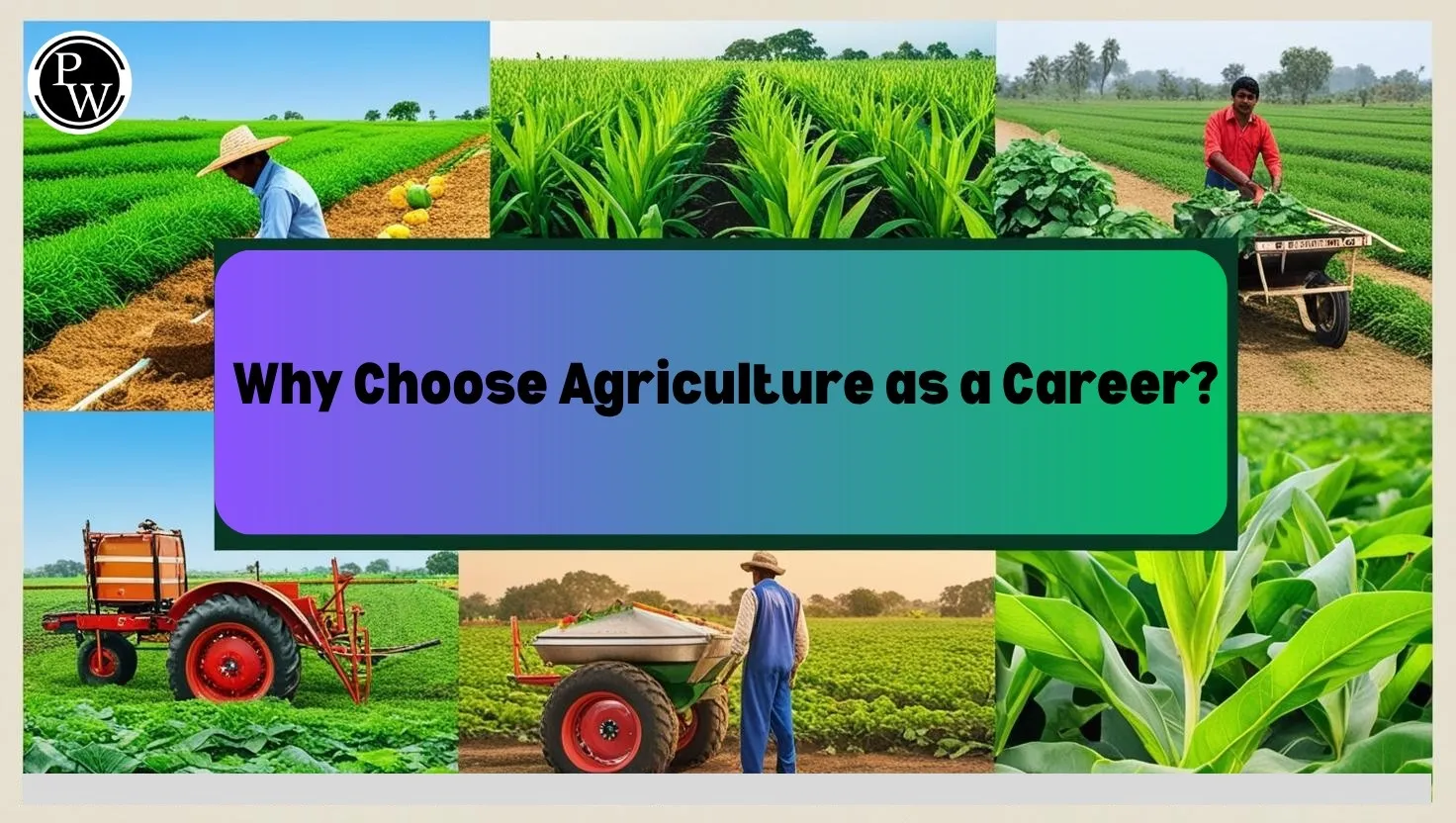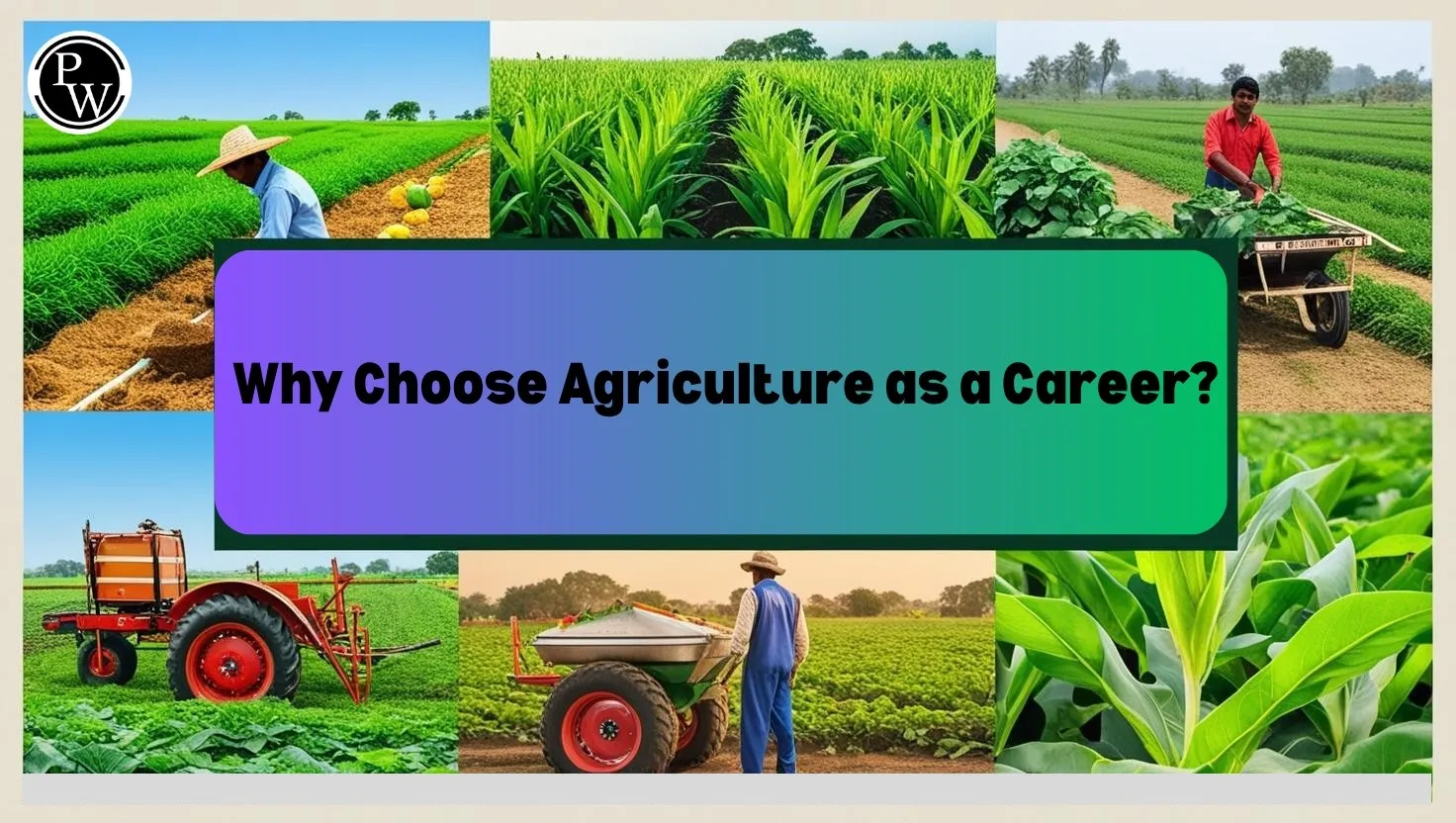

Agriculture as a career opportunity has always been thought of and also always questioned. For long, it has been considered not a stable career opportunity, but what we all forget is that it is the cornerstone of the economy. As of now, over 45% of the workforce is employed in agriculture.
Now, as the sector keeps evolving and growing due to technical and sustainable technologies, it has become lucrative. Therefore, today here we delve in deep into and understand agriculture as a career opportunity that has been evolving over the period of time.
Also, read: Career Options After B.Sc. Agriculture
What is an Agriculture Course?
Agriculture courses provide specialized knowledge in crop cultivation, livestock management, soil science, agribusiness, and modern farming technologies. These courses prepare students to enter both practical farming and research-oriented careers.
| Agriculture Courses | ||||
| Course Level | Example Courses | Duration | Eligibility | Focus Areas |
| Undergraduate | B.Sc. Agriculture, B.Tech Agricultural Engineering | 3-4 years | 10+2 with Science (PCM/PCB) | Crop production, Soil science, Horticulture |
| Postgraduate | M.Sc. Agriculture, M.Tech Agricultural Engg. | 2 years | B.Sc. Agriculture | Agronomy, Food technology, Agri-economics |
| Diploma/Certificate | Diploma in Agriculture, Agri-Business Management | 1-2 years | 10+2 or equivalent | Farm management, Entrepreneurship, Marketing |
Also, read: Career Scope of Agriculture in India: Government & Private Opportunities
Importance of Agriculture in Today’s World
Mentioned here are some of the important aspects of Agriculture that highlight the importance of agriculture in the World today. Refer to the points mentioned below to know more about the same in complete detail:
-
Economic Stability: Agricultural field largely contributes to the economic stability of the world as well as for individual countries. As per the latest reports, it contributes nearly 20% to India’s GDP.
Employment Generation: Like every other sector, the agriculture sector also provides for employment generation. It provides direct and indirect employment to millions. -
Food Security: Agriculture ensures the availability of food grains, vegetables, and fruits. Through proper supply of the food economic balance is maintained at several levels to avoid any shortages.
-
Sustainability: Promotes eco-friendly farming practices to conserve natural resources. Thereby creating several sustainable options.
Also, read: List of Competitive Exams After B.Sc Agriculture
Scope of Agriculture as a Career in India
The table below covers the scope of agriculture as a career in India. One can look at or become part of a wide range of opportunities and scopes that are generated in agriculture.
| Scope of Agriculture as a Career in India | ||
| Sector | Emerging Roles | Skill Requirements |
| Agritech | Precision farming, Drone operations | Data analytics, IoT, GPS-based farming |
| Food Processing & Nutrition | Quality assurance, Food safety, Product development | Chemistry, Microbiology, Packaging tech |
| Research & Development | Crop improvement, Biotechnology | Genetics, Plant pathology, Lab research |
| Agribusiness & Marketing | Supply chain, Export management | Business analytics, Market research |
| Sustainable Agriculture | Organic farming, Climate-resilient crops | Soil science, Environmental management |
Also, read: Government jobs after B.Sc Agriculture
Top Reasons to Choose Agriculture as a Career
Listed here are some of the top reasons for one to choose Agriculture as a career. Refer to the points below to get a clear understanding of the reasons to choose agriculture as a career in the upcoming times.
-
Diverse Opportunities: From fieldwork to lab research and corporate roles, agriculture offers a variety of career paths. This will also provide one with greater exposure to not only the field but also the booming aspects of agriculture.
-
Job Security: Agriculture is an essential sector, ensuring continuous demand for skilled professionals. It will generate a sense of Job security in a person, especially for those working their own fields.
-
Technological Growth: Modern agriculture integrates AI, drones, robotics, and GIS technology.
Career Opportunities in the Agriculture Sector
The agriculture sector as a career offers a wide range of roles. From research and production to management and consultancy, graduates can choose a career path suited to their skills and interests.
| Career Opportunities in the Agriculture Sector | |||
| Job Role | Key Responsibilities | Average Salary (INR/year) | Hiring Sectors |
| Agronomist | Crop planning, soil management, fertilizer application, pest control | ₹6,00,000 – ₹10,00,000 | Farms, Agribusiness companies, NGOs |
| Agricultural Engineer | Develop and maintain machinery, irrigation systems, and farm infrastructure | ₹5,50,000 – ₹9,00,000 | Engineering firms, Agri-machinery companies |
| Food Technologist | Ensure food quality, processing, packaging, and compliance | ₹4,50,000 – ₹8,00,000 | Food processing units, FMCG |
| Horticulturist | Cultivation of fruits, vegetables, flowers; pest and disease management | ₹4,00,000 – ₹7,50,000 | Nurseries, Horticulture farms, Research labs |
| Agricultural Economist | Study market trends, crop pricing, and policy impact | ₹7,00,000 – ₹12,00,000 | Government agencies, Banks, NGOs |
| Soil Scientist | Analyze soil composition, fertility, and conservation methods | ₹5,00,000 – ₹9,00,000 | Research institutes, Farms |
| Dairy & Animal Scientist | Improve livestock health, breeding, and productivity | ₹4,50,000 – ₹8,50,000 | Dairy farms, Veterinary institutes |
| Agricultural Researcher | Conduct studies to improve yield, pest resistance, and crop quality | ₹6,00,000 – ₹12,00,000 | ICAR, Research universities |
| Agribusiness Manager | Oversee supply chain, marketing, and financial planning in agricultural enterprises | ₹7,00,000 – ₹15,00,000 | Private companies, Export firms |
Popular Courses and Degrees in Agriculture
Several degree programs and courses prepare students for agriculture as a careers. These programs cover farming, agribusiness, food technology, and agricultural engineering.
| Course | Duration | Eligibility | Institutions Offering | Specializations |
| B.Sc. Agriculture | 4 years | 10+2 with Science | ICAR, Punjab Agricultural University | Agronomy, Horticulture, Soil Science |
| M.Sc. Agriculture | 2 years | B.Sc. Agriculture | Tamil Nadu Agricultural University | Crop Science, Plant Pathology |
| B.Tech Agricultural Engg. | 4 years | 10+2 PCM | IIT Kharagpur, PAU | Farm Machinery, Irrigation |
| Diploma in Agriculture | 1-2 years | 10+2 | State Agriculture Colleges | Farm Management, Agri-Business |
| MBA in Agribusiness | 2 years | Graduate degree | Amrita, MUJ, JAIN | Supply Chain, Marketing |
Government Jobs and Private Sector Roles in Agriculture
Both government and private sectors offer multiple roles in agriculture. These jobs range from policy-making and research to management and field operations.
| Sector | Roles | Key Employers |
| Government | Agricultural Officer, Research Fellow, Extension Officer | NABARD, ICAR, State Agriculture Departments |
| Private Sector | Agronomist, Food Technologist, Agribusiness Manager | Mahindra Agribusiness, ITC Agribusiness, Syngenta |
| NGOs & Research | Project Officer, Field Researcher | WWF, FAO, ICAR, Private Foundations |
Skills Required to Build a Successful Career in Agriculture
A successful career in agriculture requires technical knowledge, analytical skills, and the ability to adopt modern technology. Communication and problem-solving are also essential. Check the table below for more detailed information on skills required:
| Skill | Importance | How to Acquire |
| Technical Knowledge | Understanding crop science, soil, irrigation, and machinery | Degree courses, online certifications |
| Analytical Skills | Interpreting data for yield improvement, forecasting | Data analysis tools, research projects |
| Communication Skills | Working with farmers, stakeholders, and teams | Internships, workshops |
| Problem-Solving Abilities | Managing pests, climate challenges, and resource scarcity | Field experience, case studies |
| Technological Proficiency | Using drones, AI, IoT, and modern tools | Training programs, workshops |
Salary and Growth Prospects in the Agriculture Field
Agriculture careers offer competitive salaries and steady growth. Salaries vary by role, experience, and specialization, with higher opportunities in research, management, and agribusiness.
| Role | Entry-Level Salary (INR/year) | Experienced Salary (INR/year) |
| Agronomist | ₹4,50,000 | ₹8,00,000 |
| Agricultural Engineer | ₹4,00,000 | ₹7,50,000 |
| Food Technologist | ₹3,50,000 | ₹6,50,000 |
| Horticulturist | ₹3,00,000 | ₹6,00,000 |
| Agricultural Economist | ₹5,00,000 | ₹10,00,000 |
| Agribusiness Manager | ₹6,00,000 | ₹15,00,000 |
Challenges in the Agriculture Sector and How to Overcome Them
The agriculture sector faces challenges such as climate change, water scarcity, and market access issues. Awareness, modern technology, and government support help overcome these challenges.
| Challenge | Impact | Solution |
| Climate Change | Reduced crop yield and increased risk | Climate-resilient crops, drip irrigation |
| Water Scarcity | Shortage of irrigation resources | Rainwater harvesting, efficient irrigation |
| Market Access | Farmers face low income due to middlemen | Direct-to-consumer platforms, co-operatives |
| Technological Adoption | Resistance from traditional farmers | Training programs, workshops |
| Pest & Disease Management | Crop loss due to lack of expertise | Integrated Pest Management (IPM) |
Conclusion — Is Agriculture a Good Career Choice?
Agriculture provides a stable, rewarding, and impactful career path. With evolving technology, government support, and global demand, professionals can find opportunities in research, management, and entrepreneurship. Choosing agriculture as a career ensures contributing to food security, rural development, and the nation’s economic growth.
Aspirants must join Physics Wallah's Join Agriculture Online Courses to boost their readiness for the Agriculture Competitive Examinations. Our courses offer daily live classes, study notes, recorded classes, test series, and more.
